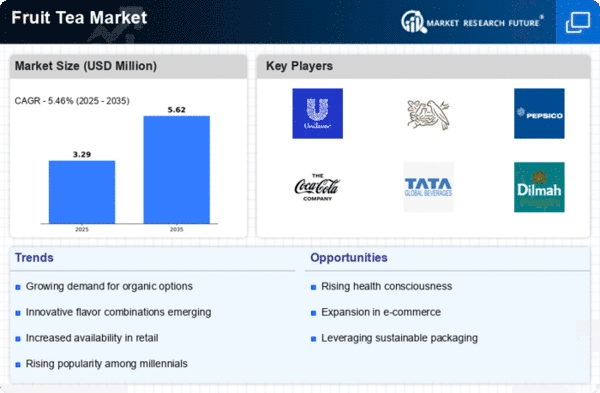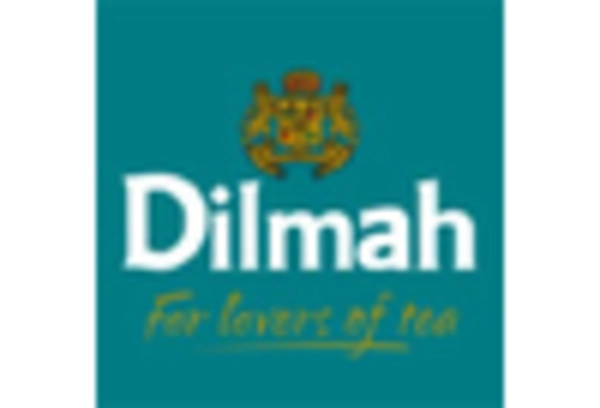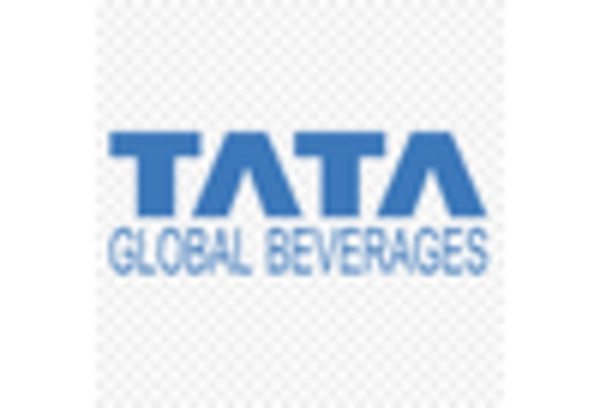Market Share
Fruit Tea Market Share Analysis
The Fruit Tea Market is a thriving and diverse sector where companies employ various market share positioning strategies to establish a strong presence and gain a competitive advantage. In this flavorful landscape, strategic decisions are crucial for navigating factors such as flavor innovation, packaging, pricing, and sustainability. Establishing its dominance, the segment has claimed a substantial share in the fruit tea market. The burgeoning growth of the conventional segment can be attributed to a notable surge in consumer demand for fruit tea products that are not only affordable but also easily accessible. This pivotal factor is steering the upward trajectory of the conventional segment within the fruit tea market.
The increasing preference for affordable options has positioned the conventional fruit tea segment as a key player in meeting consumer needs. Accessibility further contributes to the segment's robust growth, aligning with the evolving dynamics of consumer behavior. The conventional fruit tea market responds effectively to the widespread desire for readily available and cost-effective beverage choices, thus fostering its market share expansion.
As consumers seek convenient and economical fruit tea solutions, the conventional segment's prominence is underscored by its ability to cater to these demands. This aligns with a broader market trend where accessibility and affordability converge as critical determinants shaping consumer preferences. In essence, the larger market share of the conventional segment reflects its resonance with the prevailing market dynamics and the consumer-driven push for accessible and reasonably priced fruit tea options. One key market share positioning strategy in the Fruit Tea Market revolves around flavor innovation. Companies strive to differentiate their fruit tea offerings by introducing unique and appealing flavor profiles. This can involve experimenting with various fruit combinations, incorporating exotic fruits, or infusing teas with botanicals to create distinctive taste experiences. By offering a diverse range of flavors, companies can cater to different consumer preferences and attract those seeking novel and refreshing beverage options. Flavor innovation not only sets products apart on store shelves but also fosters brand loyalty among consumers who appreciate the creativity in their tea choices.
Packaging plays a significant role in market share positioning within the Fruit Tea Market. Eye-catching and environmentally friendly packaging can attract consumers' attention and contribute to a positive brand image. Companies often invest in sustainable packaging materials, such as biodegradable or recyclable options, to align with the growing environmental consciousness among consumers. Additionally, aesthetically pleasing and convenient packaging, such as colorful and resealable pouches or eco-friendly tea bags, enhances the overall consumer experience and differentiates brands in a crowded market.
Pricing strategy is a crucial factor in market share positioning within the Fruit Tea Market. Companies must find the right balance between offering competitive prices and maintaining profitability. Some may adopt a value pricing strategy, positioning their fruit teas as affordable options for a broad consumer base. Others may opt for premium pricing, emphasizing the use of high-quality ingredients, unique flavors, or organic certifications to target a more discerning market segment. The chosen pricing strategy should align with the perceived value of the product and the preferences of the target audience.
Sustainability practices are gaining prominence as a market share positioning strategy in the Fruit Tea Market. Consumers are increasingly inclined to support brands that prioritize sustainability in their sourcing and production processes. Companies that engage in ethical sourcing of tea leaves and fruits, implement eco-friendly farming practices, and use energy-efficient manufacturing methods can build a positive brand image. This strategy not only resonates with environmentally conscious consumers but also positions companies as socially responsible players in the market.
Geographic expansion is a strategic move often employed by companies to increase their market share in the Fruit Tea Market. Given the global popularity of fruit-infused teas, companies may explore opportunities to enter new regions and tap into diverse consumer bases. This could involve adapting flavors to suit regional preferences, establishing distribution networks, and navigating local regulations. Expanding geographically allows companies to access new markets, diversify their customer base, and tailor their products to specific cultural tastes.
Effective marketing and branding strategies are crucial for market share positioning in the Fruit Tea Market. Creating a strong and recognizable brand image that conveys the natural and refreshing qualities of fruit teas is key. Companies often leverage social media platforms, influencers, and engaging marketing campaigns to communicate their brand story, showcase product highlights, and connect with consumers. Building a brand that resonates with the lifestyle and values of the target audience contributes to increased consumer awareness and loyalty.


















Leave a Comment